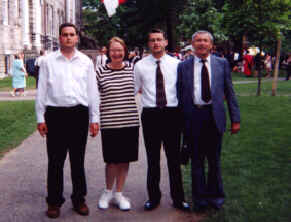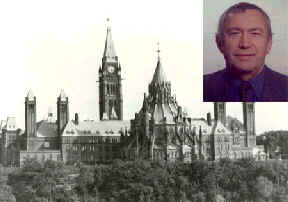In the village of
Alexanderhausen, street
names were not used, but
houses were numbered
sequentially, from 1 to
about 500. Our house
initially carried the number
187, which was later changed
to 255 when a new numbering
system was adopted. To
return home from school, I
had to cross main street to
the church, walk between two
rows of chestnut trees,
along main street to
Wirtshaus Hektor (the local
pub, later renamed the
‘House of Culture’ by the
communists), cross over to
the left, and pass another
five houses.
I can still
recall some enchanted summer
nights in the early nineteen
hundred forties. My parents
and grandparents were
sitting on benches placed in
front of the house, while I
was running around with the
other children. The air was
warm and fragrant and the
sounds of summer were
everywhere. The neighbors
were passing by and stopping
to talk; everybody appeared
friendly, contented, in
harmony with himself, with
his neighbors and with the
universe itself.
I would find out soon
enough that such a state of
perfection is not a normal
condition for us ordinary
humans. In 1942, my
grandfather died at the age
of 74. In 1943 my father was
called up to the Romanian
army. He packed his suitcase
and took the train to
Temeswar, on the way to his
regiment. After several
weeks, a postcard arrived –
from a military training
camp in Germany. I saw him
one more time, on a short
leave from the German army.
I would only see him again
in Canada, eighteen years
later.
I started Kindergarten
and then elementary school
in our village. The language
of instruction was German,
as it had always been. The
third school year started
with new teachers, and the
language of instruction had
changed to Romanian. By the
time our class graduated
from grade eight, most of us
had mastered the new
language. The experience
turned out to be helpful in
later years, when I had to
learn a few other languages
In the years after 1945
we ethnic Germans were
subjected to a series of
punishments: deportation to
the USSR; nationalization
and expropriation of the
land, houses and even
household articles and
domestic animals;
deportation of some to the
steppes of the Baragan;
sharing their houses with
colonists from other parts
of the country; and
shortages of all kind. My
grandmother, Katharina
Lukas, née Beitz, was a
talented seamstress and kept
up our only home, by working
day and night on her sewing
machine and by selling those
household articles that were
not absolutely essential.
The end of the war found
my father, Titus Tullius, as
a prisoner to British
troops. He volunteered for
casual work in England, and
later immigrated to Canada.
From there, he sent us the
occasional parcel, but the
customs duty charged by the
Romanian authorities made
these transactions
practically unaffordable.
The most cost-effective
way of completing high
school, was to commute
between Alexanderhausen and
Temeswar, six days a week.
This meant getting up around
5 AM and catching a train
around 5:30 AM. I returned
home around 6 PM to have the
only proper meal of the day,
and go to bed early.
After completing high
school, I was admitted to
attend the Technical
University Politehnica in
Temeswar/Timişoara - Faculty
of Electrical Engineering.
During this five-year course
of study, I lived in the
various student residences
and ate in the various
cafeterias. The food was
often poor, and there were
bedbugs at some dormitories.
The student revolt of 1956,
inspired by the Hungarian
revolution of the same year,
will always remain an
unforgettable experience.
In the fall of 1957, my
grandmother departed from
this world. The only home I
had ever known became an
empty house and had to be
sold. In 1958 I graduated
from the Politehnica, as its
first graduate born in
Alexanderhausen. I was
assigned a job in the city
of Arad. I rented a room in
Neuarad, handed in my visa
application in
Großsanktnikolaus, and
pursued my day-to-day
engineering work in Arad.
After a long wait, I
finally received my travel
documents in 1961 and left
for Montreal. I was very
impressed when I found out
that personal identity cards
were not used in Canada, and
people’s places of residence
were not registered with the
police or any other
authority.
I remember an early car
trip to a wedding in
southern Ontario with Joseph
Bitto (originally from
Alexanderhausen) driving.
Highway 401 was still under
construction; traveling the
country roads made it appear
to be a very long trip. We
visited my uncle Nikolaus
Lukas on his farm near
Kitchener. My aunt Katharina
(née Tilger) and my cousin
Heidrun had arrived in
Canada from Lowrin a couple
of years before me. We also
visited the other people
from Alexanderhausen, now
living in this part of
Ontario, such as the Kilcher
and Koreck families, and the
beautiful homes of the Packi,
Beisser und Lammert families
in and around Kitchener. The
trip gave me an initial
feeling for the immensity of
this country, later
confirmed by a train trip
from Montreal to Vancouver.
It took me one week to get
there, and another week to
return, crossing the immense
Canadian Prairie Provinces
and the incredibly beautiful
Rocky Mountains.
Besides us and the
already-mentioned family of
Joseph Bitto, there were
several other families from
Alexanderhausen living in
Montreal. There was Mathias
Sauer, the caretaker of our
church in Alexanderhausen,
with his wife. Their son,
Peter Sauer, also lived
there with his wife and
three children. There was
Anton Sauer, stepfather of
Joseph Bitto, and his wife
Juliana. Then there was Dr.
Kutschera with his wife,
sons Tristan and Erhardt,
and daughter Isolde. They
all lived scattered over
several parts of the city
and its suburbs, and often
met only on occasions such
as the yearly picnic of the
German Catholic church. Even
with everybody having a car,
visits and social
interactions were rare.
In August 1961 I found my
first job, with a small
company designing and
building small emergency
power generators. Most of my
coworkers were immigrants.
My starting salary was 200
dollars a month, out of
which I paid 100 dollars for
room and board. Three months
later I was offered a job by
a branch of an American
company building industrial
installations in Labrador.
The fact that the salary was
over 600 dollars a month
certainly helped me with the
decision. Our offices were
in Montreal, but I had the
chance to spend a few weeks
in the far north, in the
middle of winter. After
taking the bus to work for
almost a year, I bought my
first car: a brand new 1963
Chevrolet Impala. As I was
not familiar with buying on
credit, I paid the price of
around 3000 dollars in cash.
In 1964 I accepted an
offer from Nortel Networks
(then called Northern
Electric; later Northern
Telecom) and continued to
work there for some 36
years, until my retirement
in 2000. In the summer of
1964 I booked a trip to
Germany, Italy, Switzerland
and England. The freedom to
travel was truly
exhilarating, after being
caged in Romania for the
first 25 years of my life.
The circumstances were
favorable all around, as the
Canadian dollar was worth
four Deutschmarks.
In the early- and
mid-nineteen sixties,
Montreal was a very lively
and cosmopolitan city. The
attempts to make it a more
French city came later. I
remember a number of parties
that took place in the
downtown apartments of
friends and acquaintances.
As the evening went on, and
the drinking continued, the
noise level got louder and
louder. Invariably, some
neighbor called the police.
They showed up, asked us
very politely to reduce the
noise, and left after being
reassured that we would
oblige. Some time after
midnight, we broke it up
into small groups and headed
for the discos that remained
open until 3 AM.
Over time, initially
strong relationships and
connection with friends and
relatives in the old
homeland became weaker and
weaker. Whenever a letter
went missing, the flow of
exchange was interrupted.
Clearly, some visits would
have been required to
maintain and strengthen
these relationships. I often
contemplated to extend my
trips to Germany and
Austria, and visit the
Banat, but I never did. The
reason was a dream, a
nightmare, that kept coming
back over many years. I
dreamed that I was "back
home", I wanted to leave,
and was held back by force.
The question that woke me up
from the dream was always
the same: You had decided
that you would never take
such a risk; why did you do
it? In retrospect, the risk
does not look as bad, but it
would lead nowhere to
speculate about what could
have been or what could not
have been.
The year 1967 brought the
world exhibition Expo67 to
Montreal and I met my future
wife. Life in the late
sixties and early seventies
was easy and threatening at
the same time. Science had
given us trains and boats,
cars and airplanes,
electricity and electronics,
but also weapons that
enabled mankind to
self-destruct. Was it
responsible to establish a
family under these
conditions? Maybe not, but
it became clear to me
eventually that in the
course of its history, the
world had come close to
disaster many times, and had
always managed to survive.
To continue living on this
earth, we humans need to
have the confidence that
life on earth will go on,
that mankind has a future.
In 1971 the company
offered me a transfer to its
brand new subsidiary,
Bell-Northern Research,
located in Ottawa. In 1973
Donna and I married and had
two sons, Raimond in 1973
and Conrad in 1976. In 1976
I accepted another company
transfer back to Montreal,
as manager of a local design
group. After completing the
agreed-upon two years in
that position, we returned
to Ottawa. We bought a house
in Kanata, a western suburb
of Ottawa, with about 17 000
inhabitants, later
amalgamated with the city of
Ottawa. It took me only ten
minutes to drive to my
office, taking only a
country road. The winters
here are long and cold, with
lots of snow and the
occasional ice storm. Summer
and fall are beautiful, and
we do not get earthquakes,
floods, hurricanes, and
other natural catastrophes.
We liked it here from the
beginning, and decided to
stay. I turned down further
company transfers, including
at least one to the USA. We
think we made the right
decisions.

Conrad,
Donna, Raimond (the
graduate)
and Nick Tullius (Harvard
Yard 1996
During my working years I
made many trips to the USA
on behalf of my company. I
got to see many US cities
and made many friends. The
company also paid other
travel, taking me from
Australia to Austria, from
Kyoto in Japan to Sao Paulo
in Brazil, from Europe to
Hawaii. In the last few
years, Donna came along, and
we often added some days or
weeks of vacation. We have
traveled more after my
retirement and are hoping to
continue to do so.
Perhaps a few words about
Germans in Canada are of
interest to the reader.
Until fairly recently, every
census indicated that people
of German ethnic origin
represented the third
largest group within the
population of Canada,
placing them right behind
those of English and French
origins. In recent years,
with the increase of
immigration from Asia, it is
possible that some Asian
group may have taken that
position. Ethnic Germans
comprise people from
Germany, Austria,
Switzerland, the Banat,
Transylvania, Russia, etc.
Each group tends to have its
own organizations. There are
local clubs of Danube
Swabians, Transylvanian
Saxons, Lieblinger (from the
village of Liebling in the
Banat), and many others. The
German-Canadian Congress is
the umbrella organization
for all these groups. German
language schools exist in
many cities and are usually
open Saturday morning. Our
sons attended the one in
Ottawa for seven or eight
years. As far as the
day-to-day life of German
Canadians is concerned, the
situation is a lot more
complex. They are scattered
throughout the cities, often
reducing their social
contacts down to little more
than meeting once a year at
a new year’s eve
celebration. The language of
communication, at least in
public, is mostly English.
The contribution of German
Canadians to the economic,
political and cultural
development of Canada is
often underrated, if not
suppressed, and their image
has suffered because of the
two World Wars. For those
readers interested in this
topic, I would recommend the
book "The German Canadians
1750 – 1937" by Lehmann and
Bassler (Jesperson Press,
1986).
The arrival of the
twenty-first century also
brought my retirement from
full-time work. Our older
son graduated from law
school and lives in the
United States. Our younger
son obtained his bachelor of
computer science degree,
joined a high-technology
company, and was ‘downsized’
when the steam went out of
hi-tech. We continue to live
in our house in suburban
Ottawa. Finally I have time
to read, write, and
translate, often material
related to the history and
culture of the
Danube-Swabians. And we
continue to travel the
world.
Looking back at it all, I
must conclude that my
generation has lived through
interesting times. It
survived a destructive war
and witnessed the rise and
demise of more than one
totalitarian system. Thanks
to new means of
communication such as
e-mail, I remain in touch
with friends and classmates
from Alexanderhausen and
from Temeswar. All of them
have left our once beautiful
village; most have returned
to their roots in Germany,
thus closing the circle
opened by their ancestors
when they left Germany for
the Banat, some two hundred
and fifty years ago. Others
ended up in other countries,
sometimes on other
continents. Our new
countries deserve our
undying gratitude for giving
of us the chance for a new
beginning.
Deep down in our
consciousness, we will
always retain a spot of
tenderness, like a wound
that never heals: the memory
of the Banat, the memory of
our forefathers who lived
there, who did so much to
made it a fertile and
beautiful land, and who will
rest forever in its soil.
Those who
built our splendid homeland,
How they suffered, how they
died,
Will live on in our hearts!
Updated 2009.01.04

